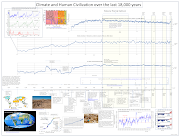The Schrödinger equation as the basic model of atom physics descended as a heavenly gift to humanity in an act of godly inspiration inside the mind of Erwin Schrödinger in 1926.
But the gift showed to hide poison: Nobody could give the equation a physical meaning understandable to humans, and that unfortunate situation has prevailed into our time as expressed by Nobel Laureate Steven Weinberg (and here):
- In searching for an interpretation of quantum mechanics we seem to be faced with nothing but bad choices.
- My own conclusion (not universally shared) is that today there is no interpretation of quantum mechanics that does not have serious flaws, and that we ought to take seriously the possibility of finding some more satisfactory other theory, to which quantum mechanics is merely a good approximation.
Weinberg's view is a theme on the educated physics blogosphere of today:
- Testing Quantum Foundations With Atomic Clocks (Sabine)
- Lindblad equation can't solve any "problems" of quantum mechanics (Lubos)
Sabine agrees with Weinberg that "there are serious problems", while Lubos insists that "there are no problems".
There are two approaches to mathematical modelling of the physical world:
- Pick symbols to form a mathematical expression/equation and then try to give it a meaning.
- Have a meaningful thought and then try to express it as a mathematical expression/equation.
Schrödinger's equation was formed more according to 1. rather than 2. and has resisted all efforts to be given a physical meaning. Interpreting Schrödinger's equation has shown to be like interpreting the Bible as authored by God rather than human minds.
What makes Schrödinger's equation so difficult to interpret in physical terms, is that it depends on $3N$ spatial variables for an atom with $N$ electrons, while an atom with all its electrons seems to share experience in a common 3-d space. Here is how Weinberg describes the generalisation from $N=1$ in 3 space dimensions to $N>1$ in $3N$ space dimensions as "obvious":
- More than that, Schrödinger’s equation had an obvious generalisation to general systems.
Weinberg takes for granted that what "is obvious" does not have to be explained. But everything in rational physics needs rational argumentation and nothing "is obvious", and so this is where quantum mechanics branches off from rational physics. If what is claimed to be "obvious" in fact lacks rational argument, then it may simply be all wrong. The generalisation of Schrödinger's equation to $N>1$ fell into that trap, and that is the tragedy of modern physics.
There is nothing "obvious" in the sense of "frequently encountered" in the generalisation of Schrödinger's equation from 3 space dimensions to 3N space dimension, since it is a giant leap away from reality and as such utterly "non-obvious" and "never encountered" before.
In realQM I suggest a different form of Schrödinger's equation as a system in 3d with physical meaning.
There is nothing "obvious" in the sense of "frequently encountered" in the generalisation of Schrödinger's equation from 3 space dimensions to 3N space dimension, since it is a giant leap away from reality and as such utterly "non-obvious" and "never encountered" before.
In realQM I suggest a different form of Schrödinger's equation as a system in 3d with physical meaning.
PS Note how Weinberg describes the foundation of quantum mechanics:
- The first postulate of quantum mechanics is that physical states can be represented as vectors in a sort of abstract space known as Hilbert space.
- According to the second postulate of quantum mechanics, observable physical quantities like position, momentum, energy, etc., are represented as Hermitian operators on Hilbert space.
The idea that the notion of Hilbert space is central to quantum mechanics was supported by an idea that Hilbert space as a key ingredient in the "modern mathematics" created by Hilbert 1926-32 should be the perfect tool for "modern physics", an idea explored in von Neumann's monumental Mathematical Foundations of Quantum Mechanics. Here the linearity of Schrödinger's equation is instrumental and its many dimensions doesn't matter, but it appears that von Neumann missed the physics:
- I would like to make a confession which may seem immoral: I do not believe absolutely in Hilbert space no more. (von Neumann to Birkhoff 1935)







Inga kommentarer:
Skicka en kommentar